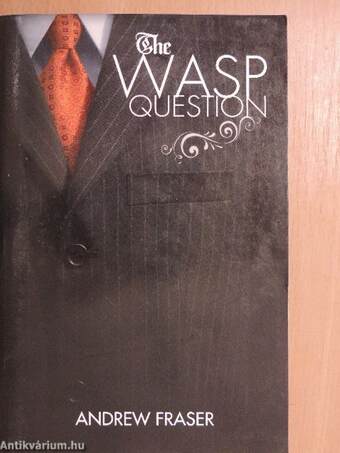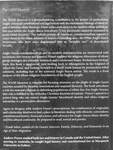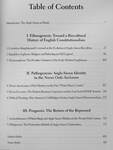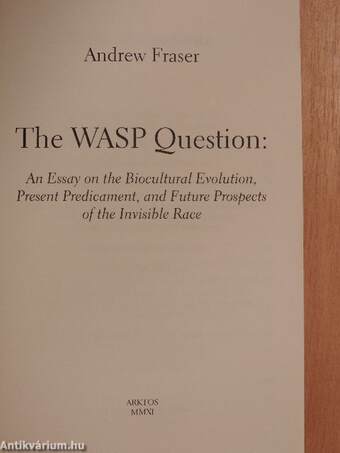1.068.093
kiadvánnyal nyújtjuk Magyarország legnagyobb antikvár könyv-kínálatát

VISSZA
A TETEJÉRE
JAVASLATOKÉszre-
vételek
The WASP Question
An Essay on the Biocultural Evolution, Present Predicament, and Future Prospects of the Invisible Race
| Kiadó: | Arktos Media Ltd |
|---|---|
| Kiadás helye: | London |
| Kiadás éve: | |
| Kötés típusa: | Ragasztott papírkötés |
| Oldalszám: | 418 oldal |
| Sorozatcím: | |
| Kötetszám: | |
| Nyelv: | Angol |
| Méret: | 22 cm x 14 cm |
| ISBN: | 978-1-907166-29-7 |
naponta értesítjük a beérkező friss
kiadványokról
naponta értesítjük a beérkező friss
kiadványokról
Fülszöveg
The WASP Question
The WASP Question is a groundbreaking contribution to the project of synthesizing
Anglo-American constitutional and legal history with the evolutionary biology of ethnicity
and a Christian ethno-theology. Fraser adds a new aspect to the modern ethno-pathology
that now infects the Anglo-Saxon bioculture: "Civic patriotism cannot be sustained in
multi-racial societies." His radical critique of American constitutionalism exposes a
major threat to the ethnic interests of Americas founding race—the White Anglo-Saxon
Protestants who have since degenerated into an "invisible race" of deracinated
WASPs. " 4 " " -
Anglo-Saxon constitutionalism and its modern deconstruction are intertwined with
excursions into history and genetics. Fraser explores the religious dimension of ethnic
group strategies in a plausible historical and evolutionary frame. Evolutionary biology
lends this book a magisterial view looking back to ethnogenesis in the England of
Alfred the... Tovább
Fülszöveg
The WASP Question
The WASP Question is a groundbreaking contribution to the project of synthesizing
Anglo-American constitutional and legal history with the evolutionary biology of ethnicity
and a Christian ethno-theology. Fraser adds a new aspect to the modern ethno-pathology
that now infects the Anglo-Saxon bioculture: "Civic patriotism cannot be sustained in
multi-racial societies." His radical critique of American constitutionalism exposes a
major threat to the ethnic interests of Americas founding race—the White Anglo-Saxon
Protestants who have since degenerated into an "invisible race" of deracinated
WASPs. " 4 " " -
Anglo-Saxon constitutionalism and its modern deconstruction are intertwined with
excursions into history and genetics. Fraser explores the religious dimension of ethnic
group strategies in a plausible historical and evolutionary frame. Evolutionary biology
lends this book a magisterial view looking back to ethnogenesis in the England of
Alfred the Great, and looking forward to a world made human by postmodern tribal
solidarity, including that of the scattered Anglo-Saxon nation. The result is a fresh
analysis of the ethno-religious foundations of the English people.
The WASP Question is valuable for focusing attention on the plight of Anglo-Saxon
societies assailed by runaway materialism and imposed diversity. The book articulates
a role for national religions iii defending populations of ethnic kin. For Anglo-Saxons,
that role is fulfilled by the orthodox Christian doctrine of nations. Fraser's appeal to a
patriot king who can restore Anglo-Saxons' biocultural identity and ethno-religious
autonomy is a provocative alternative.
Agree or disagree with Andrew Frasers prescriptions, his combination of originality
and scholarship deserves to find a place in literature dealing with ethnicity, nationalism,
constitutional history, biosocial science, and advocacy for Anglo-Saxon ethnic identity
and biocultural continuity. Be prepared to read, reread and ponder.
- Frank Salter, author of On Genetic Interests: Family, Ethnicity, and Humanity in an
Age of Mass Migration.
Andrew Fraser studied bath law and history in Canada and the United States. After
moving to Australia, he taught legal history and constitutional law at Macquarie
University in Sydney. Vissza
Témakörök
- Történelem > Társadalomelmélet
- Idegennyelv > Idegennyelvű könyvek > Angol > Természettudományok > Biológia
- Idegennyelv > Idegennyelvű könyvek > Angol > Művelődéstörténet
- Idegennyelv > Idegennyelvű könyvek > Angol > Vallás > Kereszténység
- Idegennyelv > Idegennyelvű könyvek > Angol > Történelem > Egyéb
- Művelődéstörténet > Kultúra > Kultúrantropológia
- Művelődéstörténet > Átfogó művek, tanulmányok
- Jogtudomány > Állam- és közigazgatás
- Jogtudomány > Története
- Természettudomány > Biológia > Fajfejlődés > Evolúció (származástan)
- Természettudomány > Biológia > Fajfejlődés > Idegennyelvű
- Történelem > Idegennyelvű > Angol
- Idegennyelv > Idegennyelvű könyvek > Angol > Jogtudomány > Egyéb
- Történelem > Politika > Politikai rendszerek
- Történelem > Politika > Ideológiák > Nacionalizmus
- Történelem > Tanulmányok
- Vallás
- Vallás > Kereszténység > Tanulmányok
Andrew Fraser
Andrew Fraser műveinek az Antikvarium.hu-n kapható vagy előjegyezhető listáját itt tekintheti meg: Andrew Fraser könyvek, művekMegvásárolható példányok
Nincs megvásárolható példány
A könyv összes megrendelhető példánya elfogyott. Ha kívánja, előjegyezheti a könyvet, és amint a könyv egy újabb példánya elérhető lesz, értesítjük.







